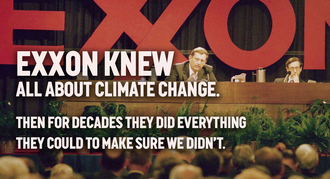-
Investigate Exxon: New Hampshire Attorney General Joseph A. FosterRight now, we have a chance to expose Exxon Mobil and push for the truth about what they have known for several decades concerning climate change. If we can shine a light on this case, we'll be one step closer to reining in an industry that still continues to drive the climate crisis. Attorneys General in New York, California, Massachusetts, and the U.S. Virgin Islands have already announced they're investigating, and Attorneys General across the country are thinking considering about following suit being part of the fight. But we need your help in calling on Attorney General Foster to they need to know that we’re watching, and that we demand they act now and join the investigation. These sorts of investigations proved Big Tobacco was knowingly poisoning our children -- and now they can show Big Oil has been knowingly poisoning our air, water, and climate. So please, join in urging on Attorney General Foster to fight on behalf of Granite Staters: Exxon Mobil’s day in court has come -- they need to tell the truth in court, and face the consequences of their lies.713 of 800 SignaturesCreated by Becky Wasserman
-
Investigate Exxon: Vermont Attorney General William H. SorrellBig news broke last year: Exxon knew about climate change in the 1970s. They *researched* it. And surprise, surprise, they’ve been lying about it ever since. Not only did Exxon not come clean about what they found -- they've spent tens of millions of dollars over the past forty years trying to convince us all that climate change isn’t real. When that didn’t work, they said climate change isn’t that bad, and when that failed, they said, “Oh hey, it’s not our fault.” We’re talking about what could be the largest case of fraud in human history. It’s no secret that the fossil fuel industry is a blight on the planet. But right now, we have a chance to do real damage to Exxon, and push their shady, oil company lies out into broad daylight. If we can shine a light on this case of blatant fraud, we'll be one step closer to dismantling the power of an industry that's still recklessly -- and knowingly -- driving the climate crisis. Governor Peter Shumlin and Vermont legislators have already called out Exxon for the bad actor they are, urging divestment of the state pension funds. New York State’s Attorney General had already begun an investigation, and on March 29, he and sixteen other AGs, including Attorney General Bill Sorrell, announced that they're jointly exploring "ongoing and potential investigations into whether fossil fuel companies misled investors and the public on the impact of climate change on their businesses." We applaud this announcement, and we urge Attorney General Sorrell to start an investigation of Exxon. These sorts of investigations are what convinced America about the evil of Big Tobacco -- it’s time for Big Oil to get the same treatment. So please, join the call: Exxon’s day in court has come -- they need to tell the truth in court, and face the consequences of their lies and fraud.832 of 1,000 SignaturesCreated by Austin Davis

-
Investigate ExxonLast fall, we learned that Exxon researchers alerted company management to the grave threats of climate change in the 1970s...and the company's executives have been lying about it ever since. Not only did Exxon not disclose the dangers -- its executives spent tens of millions of dollars trying to convince the world that climate change isn’t real; this hobbled effective political action for decades. In circles where that didn’t work, they said that climate change wasn't that bad, and wasn't an urgent problem. This was the most devastating coverup in human history. We can't have those decades back. But if Exxon is held accountable, we'll be one step closer to dismantling the power of an industry that's still driving us towards disaster, and making them pay for their wrongs. New York State’s Attorney General has already started an investigation, and on March 29, he and sixteen other AGs announced that they're jointly exploring "ongoing and potential investigations into whether fossil fuel companies misled investors and the public on the impact of climate change on their businesses." Here in Washington, Attorney General Ferguson needs to know that he has the support he needs to start an investigation. Investigations like this showed the evils of Big Tobacco -- it’s time for Big Oil to face the same scrutiny. We want Washington state to be in 100%. So please, join the call: we need to hear the truth in a court of law, and Exxon needs to face the consequences of its deception.1,506 of 2,000 SignaturesCreated by 350 Seattle
-
Investigate ExxonBig news broke last year: Exxon knew about climate change in the 1970s. They *researched* it. And surprise, surprise, they’ve been lying about it ever since. Not only did Exxon not come clean about what they found -- they've spent tens of millions of dollars over the past forty years trying to convince us all that climate change isn’t real. When that didn’t work, they said climate change isn’t that bad, and when that failed, they said, “Oh hey, it’s not our fault.” We’re talking about what could be the largest case of fraud in human history. It’s no secret that the fossil fuel industry is a blight on the planet. But right now, we have a chance to do real damage to Exxon, and push their shady, oil company lies out into broad daylight. If we can shine a light on this case of blatant fraud, we'll be one step closer to dismantling the power of an industry that's still recklessly -- and knowingly -- driving the climate crisis. New York State’s Attorney General has already started an investigation, and AGs across the country are thinking about following suit. In Oregon, our AG needs to know that they have all the support they needs from fellow Oregonians to start an investigation in our home state. But they need to know that we’re watching, and that we demand they act now. These sorts of investigations are what convinced America about the evil of Big Tobacco -- it’s time for Big Oil to get the same treatment. So please, join the call: Exxon’s day in court has come -- they need to tell the truth in court, and face the consequences of their lies and fraud.1,034 of 2,000 SignaturesCreated by 350 Salem OR
-
Investigate ExxonDuring this time—while a whole generation was being deprived of the opportunity to begin taking meaningful steps to avert climate catastrophe--the warming of the earth has steadily increased. Species have begun to die. People have begun to die. Exxon, in the meantime, has taken in profits during some of these years larger than any corporation has ever seen. Has there ever been a greater, more consequential case of fraud in history? It is time that Exxon be called to account. You, Attorney General Mills, have just joined a coalition of state Attorneys General dedicated to combating climate change and bringing to justice those who by intentional deception are shown to have broken the law and violated the public trust. In that connection, you have said: "Our natural resources are the lifeblood of our state’s economy and our quality of life. Global climate change demands immediate action and I am committed to using the authority of my office to address the problem in a meaningful way by defending important EPA regulations against attacks led by the coal industry and exploring litigation options that will hold the worst polluters accountable for their actions.” For these words and for that step, we thank you. Now we call upon you to take a further step. Once before—through litigation against Big Tobacco brought by a coalition of states Attorneys General—corporate deceptions on a till then unthinkable scale were exposed and punished. It is time for Big Oil to be subjected to the same scrutiny. We put our names to this petition asking that you, as Maine’s Attorney General, seize this historic opportunity to investigate Exxon—thereby pushing the lies and the deception out into broad daylight and bringing us a step closer to dismantling the power of an industry that's still recklessly -- and knowingly -- driving the climate crisis. The time for Exxon’s day in court has come. The truth must come out and Exxon be called to account.479 of 500 SignaturesCreated by Jesse McMahon
-
Support the Heathrow 13 and stop the new runway!13 climate protesters are facing prison to silence protest against new runways which would wreck Government policy to protect us from catastrophic climate change. The Paris agreement underlines the need to cut emissions now. Aviation is the fastest growing source of carbon emissions and the only way to reduce emissions from aviation to a safe level is to reduce the number of flights. Despite David Cameron’s ‘no ifs, no buts’ election and manifesto promise to not build a new runway following massive public outrage at the proposals, the Government is now breaking its promise. There is more than enough aviation capacity for people’s annual holidays and the declining number of business flights. Airport growth is driven by a minority of frequent fliers who take the majority of UK flights to second homes and tax havens. Meanwhile, emissions from aviation are destroying people’s lives. People in the Heathrow area, who already have to breathe illegal levels of air pollution and suffer intolerable noise, would now see their homes destroyed. People across the UK have been flooded at Christmas, and every year hundreds of thousands more people die due to climate change - mostly in poor countries in the Global South, the people least responsible for emissions. The Government is expected to make its decision on whether to expand Heathrow or Gatwick – or neither, if we are successful – this year. It’s one or the other: build new runways or protect us from climate chaos. The people in the Global South who are dying due to climate change already have no voice in the debate. We can show them that jailing peaceful protesters will not silence those of us who do.3,006 of 4,000 SignaturesCreated by Plane Stupid
-
Get polluters out of politicsDespite more than two decades of talking, our climate is at a crisis point because our leaders have allowed themselves to be captured by the fossil fuel industry. If our politicians are serious about climate change, then they need to stop taking money from and giving money to the big polluters.2 of 100 SignaturesCreated by Charlie Wood
-
Americans should be able to buy the 7 seat Prius V available in the rest of the worldHi - I, like many of us eco-conscious parents would love to have a fuel efficient vehicle to carry 7 passengers but are stuck with mini-vans or SUVs if we want to carry a larger group. The only fuel efficient 7 seat car on the market is a Tesla, starting at $70,000, this vehicle is out of the range of many. Imagine my delight when I found that the Toyota Prius V offers a 7 seat option - a 40 mpg 7 seat car! And then I found this model is offered world-wide but not in the Americas. First, the excuse that the batteries were different - the US model used a cheaper larger Ni -metal hydride battery which did not allow the space for the third row seat. This changed with the 2016 models - all Prius V's now use the smaller lithium ion battery - When I heard of this upgrade I waited anxiously for the new release of the 2016 model. Surely we could now have the 7 seat option? But no! Toyota still does not offer this package even as an option - and when I have inquired from corporate sources they claim it is because "Americans don't want a small 7 seat car." Interestingly, I hear the opposite from nearly every parent I mention this to. The response I get is "Wow! I would get that in a minute!" Even a floor salesperson at our local Toyota exclaimed "if there was a 7 seat Prius, we couldn't keep it on the lot!" I believe that Toyota is trying to force consumers into more expensive, less fuel efficient cars to improve their bottom line - now that the batteries are the same there is simply no reason the 7 seat model could not be offered as an option...except it might decrease their sales of Highlanders and mini-vans. (This is the option the company gave me in emails and phone calls) Toyota needs to be called out on this. Imagine the improvement there would be in emissions if just a percentage of families switched out of their 7 seat SUVS into a eco-friendly hybrid car.... -ps - as for the argument I have occasionally read that the reason Toyota does not release the 7 seat Prius in the US "is because American safety laws are too stringent for a 7th row." Poppycock! When the V was released with 5 seats and no 7 seat option in the US markets, spokespeople never used different safety requirements as a reason - what is sited in numerous articles was the higher cost to use the smaller battery or lack of space for "Americas typically larger build." Further EU and Australian safety standards are hardly lax.968 of 1,000 SignaturesCreated by Julie Bolton
-
Reduction of Plastics in Panda ExpressPlastics that we use and fail to recycle end up in the landfills, and often times into our oceans where they congregate into gyres which the Gyre Cleanup Project describes as a “naturally occurring vortex of wind and currents that rotate in a clockwise direction in the northern hemisphere and [counterclockwise] in the southern hemisphere.” These gyres attract the plastics to the center of the gyre and, over the years, have created what we call the Great Pacific Garbage Patch. Once reaching the center, and even before, the plastics begin to break down into microplastics that enter the ecosystems and end up concentrating in the top of the food chain through biomagnification this can cause the animals to starve or can kill them through lead poisoning. The best way to fix this problem is through preventing the plastics from ever reaching the oceans, and reducing our overall use of plastics. This is easiest in cases like Panda Express where their plastic products are easily replaced by less harmful alternatives, like cardboard boxes and reusable containers.13,138 of 15,000 SignaturesCreated by Ben Pearson
-
UMass Alumni: Urgent call for Trustees to vote to Divest from Fossil Fuels on December 9, 20151. Climate Change - Global warming is making the seas rise, the glaciers melt, and wreaking havoc for millions of the poorest people on the planet; 2. Keep Fossil Fuels in the Ground - It is essential that the oil, natural gas, and coal companies leave 80% of the available fossil fuels in the ground to keep the temperature from rising more than 2 degrees Celsius; 3. It is a Moral Responsibility - The UMass Board of Trustees has a moral responsibility to do everything it can do can to ensure that today’s and tomorrow’s University of Massachusetts’ students have a good life on an inhabitable planet as “global temperatures are running far above last year’s, all but guaranteeing that 2015 will be the hottest year in the historical record.” (“2015 Likely to Be Hottest Year on Record,” by Justin Gillis, The New York Times, October 22, 2015) 4. Time to act is NOW - as world leaders will be in Paris in December, while the Board of Trustees are in Lowell, to approve plans to dramatically reduce their nation’s fossil fuel consumption. Since President Meehan has stated that he wants the University of Massachusetts to become one of the top 20 universities in the country, this is a perfect opportunity for the University to be a leader on the most important issue of the 21st Century - Climate Change. Other higher education institutions like Stanford (Coal only) and University of California (Coal and Tar Sands Only) have voted for partial divestment. UMass can show it is a leader, role-model, and world class institution by voting to fully divest of all types of fossil fuels including Coal, Tar Sands, Oil, and Natural Gas from its investments - both direct and indirect (i.e. co-mingled funds).218 of 300 SignaturesCreated by Bryan Moss
-
Ask South Yorkshire Pension Authority to invest ethically and divest from fossil fuelsSince its formation in 1988, South Yorkshire Pensions Authority has worked hard on behalf of its nearly 140,000 members to provide them with a safe and secure future in retirement. Yet while ever it invests in unethical companies or industries, including fossil fuels and tobacco, the Authority is putting these achievements at great risk, by undermining long-term commitments to maximise pension fund investments and to provide good service to fund members. (The over 300 employers contributing to the Authority's schemes are also at risk, as it is they who will ultimately meet any shortfall in the cost of providing scheme benefits to retired members.) The South Yorkshire Pensions Authority (SYPA) which manages the Local Government Pension Scheme has £259m invested in companies with fossil fuel and fracking connections such as Shell, BP and Glencore, 4.25% of its £6.1bn holdings (as at Mar 2016). It also holds investments in companies which fail to balance their focus on profit with the social and environmental responsibilities expected in the modern day. We believe it is morally indefensible to invest in companies that destroy our climate and so leave to our children a world where life as we know it is unsustainable. And that it is financially irresponsible to invest in such a high risk sector where the experts agree that the assets are currently wildly overstated and where share prices are certain to plummet.701 of 800 SignaturesCreated by Janet paske
-
No public money for the Euro-Caspian Mega PipelineLast week, as the European Games begin in Baku, I was detained in Azerbaijan for speaking out against the fossil fuel funded Azeri regime. I was lucky, I was released. There are over 100 people facing years in Azeri jails - activists, journalists, filmmakers, academics and lawyers - anyone who criticises the regime. People like Rasul Jafarov. Rasul is a young, charismatic activist who founded the Sport for Rights campaign. He planned highlight the number of political prisoners in Azerbaijan during the Games, however a few weeks after starting the campaign Rasul himself became a political prisoner. The Euro-Caspian Mega Pipeline will keep the repressive Aliyev regime in power by ensuring that fossil fuel revenues keep flowing to the country's ruling elite. The EBRD's loan to Lukoil will further entrench the Aliyev regime, buying them influence and money and making it making it even harder for those organising for democracy in Azerbaijan. The Euro-Caspian Mega Pipeline is also a disaster for the climate. It will lock Europe into fossil fuels for the next fifty years and pump over 2 billion tonnes of CO2 into the atmosphere. If Europe is to avert the worst impacts of climate change, both at home and elsewhere, we must stop this pipeline. On 22 July the EBRD needs to say no to funding the Euro-Caspian Mega Pipeline and send a signal to the growing resistance along the route of the pipeline that the era of fossil fuels is coming to an end.2,741 of 3,000 SignaturesCreated by Emma Hughes











